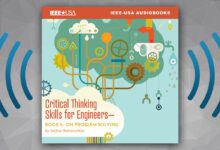
On 17 September, a delegation from the IEEE Eastern North Carolina Section presented IEEE-USA’s 2012 Distinguished Public Service Award to Rep. David Price. The presentation was made in the Congressman’s Raleigh, N.C., office.
Paul Goodson, chair of the section’s PACE Committee, led the IEEE delegation. Tom Jepsen (past chair), Roger Lawrence (Power & Energy / Industry Applications joint society chair), Steve Munie, and Michael Steer also represented IEEE.
The IEEE-USA Public Service Award recognizes individuals who are not currently engineers, but who have significantly contributed to the professional goals of IEEE in the United States. The award is frequently given to a Member of Congress or federal employee who has acted to support or protect American engineers.
In this case, Rep. Price was recognized, according to the official citation that accompanies the award, for his “dedication and tireless efforts to support engineering education and research.”
Rep. Price is a senior Democrat representing north central North Carolina, including much of the Research Triangle area. As such, he is uniquely aware of the importance of innovation and technology to our economy. As a member of the powerful House Appropriations Committee, Rep. Price has been an effective and strong defender of federal R&D budgets.
Rep. Price has devoted most of his efforts towards improving education, especially STEM education, at all levels. As creator of the Teaching Fellows Program, for example, he provided incentives for students to become teachers, and his Keep Teachers Teaching Act rewards especially innovative and dedicated teachers for their efforts.
Other legislative Initiatives from Rep. Price include:
- Sponsorship of the Advanced Technological Education program at the National Science Foundation, which supports innovative teaching methods at community colleges, particularly in STEM fields
- His Price Education Affordability Act allowed families to deduct college costs from their taxes, helping middle-class families better afford college
- Provided leadership to secure the reauthorization of the R&D Tax Credit and the Small Business Innovation Research (SBIR) program
Rep. Price is an active member of the Congressional R&D Caucus and STEM Education Caucus. He was also recognized for his efforts to protect science funding by the Science Coalition, which named him one of their Champions of Science this past May.
Rep. Price was chosen to receive the 2013 IEEE-USA Public Service Award as part of the IEEE-USA Annual Meeting in Portland, Oregon, but was unable to attend the ceremony. The IEEE Eastern North Carolina Section, which encompasses the Congressman’s district, jumped at a chance to present the award themselves. After all, no one knows Rep. Price’s dedication to STEM education better than his own constituents.
Shortly after the IEEE-USA Annual Meeting in early August, PACE Chair Paul Goodson contacted the Price’s local office in Raleigh, N.C., to see if a meeting could be arranged. After a number of e-mail conversations with the Congressman’s Scheduler, a time was eventually found that worked for both the Congressman and the local section.
Mr. Goodson contacted the section leadership and other prominent engineers in his section to see who else wanted to attend the ceremony. In the end, four IEEE members joined Paul for an extended conversation with Rep. Price. In addition to presenting the IEEE-USA award, they discussed IEEE-USA legislative priorities, including energy policy, the federal budget, and immigration reform.
“Usually, people just ask legislators for things,” explained Goodson. “It was nice to be able to give Rep. Price recognition for his years of work looking out for technology professionals and promoting STEM education and research. I think he was genuinely touched by our gesture.”
IEEE sections don’t need to present legislators with an award to have a meeting with them. Arranging a face-to-face meeting with your legislators in your local community isn’t even that hard, as long as you are willing to be patient and flexible.
If you are interested in meeting with elected officials in your local area, either as part of a delegation from your IEEE section, or just with a group of engineers, following these steps usually works:
First, decide who you want to meet with and why. Legislative meetings are not social calls, but rather business meetings. What business do you want to discuss? What issues are you concerned about?
Second, call the legislator’s local office (IEEE-USA can help) at least a month prior to when you want to meet. Ask for the Scheduler. Tell him/her that you and a number of technology engineers from your area would like to meet with the legislator at that office, or one close by. You will likely be asked to put your request in writing (e-mail), which you should do. Include suggested dates and times for your meetings, as well as background information on IEEE and your section, in that e-mail.
Third, wait about a week for the Scheduler to call you back (unless the Scheduler gave you a specific date by which a decision should have been reached.) Then, politely call again and ask if time has been found on the Congressman’s agenda for you. Don’t expect an answer. The purpose of your second call is to remind the staff about your request, and let them know that you don’t plan on dropping it. This step will focus their attention, and help them take you seriously.
In most cases, the staff will be able to find time for you to hold a meeting with your legislator, but rarely at the time you have requested. Be flexible. The average member of Congress has about 700,000 people in his/her district. They can’t meet all of them. The staff will be willing to work with you to find a time that works for, if not all of your group, at least most of them.
Once you have agreed on a time and date, organize your team, finalize your messages, prepare a leave-behind packet (IEEE-USA can help), and agree on how you will run your meeting. Arrive at the office at least 15 minutes before your meeting is scheduled to start, to get organized. Then, meet.
For district meetings, expect to have at least half an hour with a member of Congress. Goodson’s team had 45 minutes alone with Rep. Price.
Sometimes, you will not be able to coordinate schedules with your legislator. In those cases, the staff will usually offer to meet with you in place of your elected official. Take the meeting. Legislative district staff is paid to listen to voters and pass information up to the official. While staff meetings are not as powerful as meeting directly with an elected official, they can still be very valuable.
There is never a bad time to communicate with one of your elected leaders.
IEEE-USA can help with all of this. Contact IEEE staffer Russ Harrison at (202) 530-8326 or r.t.harrison@ieee.org for assistance.
Russell T. Harrison is IEEE-USA’s senior legislative representative for grassroots affairs.

From left to right: Michael Steer, Tom Jepsen, Rep. Price, Paul Goodson, Roger Lawrence, and Steve Munie

Eastern North Carolina Section PACE Chair Paul Goodson (right) presenting Rep. David Price with the 2013 IEEE-USA Public Service Award.

Rep. David Price discusses policy with IEEE Eastern North Carolina PACE Chair Paul Goodson. Price is holding a copy of IEEE-USA’s 2013 Energy Policy Recommendations.






